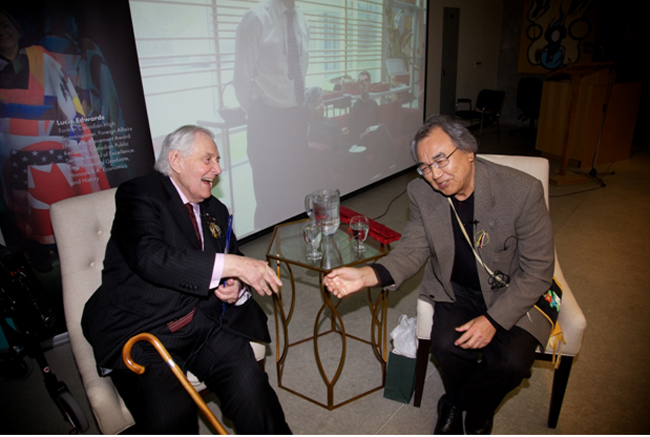Trent installs honourary Elders

PETERBOROUGH – Two men instrumental in the establishment of the first Indigenous Studies program in North America have been installed as honourary Elders by Trent University.
A 1968 conversation between the university’s founding president, Thomas H. B. Symons, and student Harvey McCue, Georgina Island FN, led to the launch of the Indian-Eskimo Studies program the following year. When the program officially started in 1969, Prof. McCue was hired to administer and teach in it, serving as acting chair in 1971 and remaining an instructor in Native Studies until his departure from the University in 1983, having attained the rank of associate professor.
Following his time at Trent, Prof. McCue went on to serve as the director of Education Services in the Cree School Board in James Bay, Quebec, for five years, where he oversaw the implementation and development of all elementary and secondary school curricula throughout the Cree jurisdiction.
Prof. McCue became director of policy in the Education Branch at Indian Affairs in Ottawa, and, two years later, as director general, he became the inaugural First Nations head of Indian education in the history of Indian Affairs. He has also served as the first CEO and director of education of the Mi’kmaq Education Authority in Nova Scotia and on the boards of the Ontario Aboriginal Sports Circle, Breakfast for Learning, the National Reading Campaign, and the Ontario Heritage Trust. Currently, Prof. McCue is a member of Trent University’s Board of Governors and serves as chair of the Board’s Advancement Committee.
Professor Tom Symons played a key part in the establishment of Trent University, taking on the role of president when the University opened in 1964. In 1966 he recruited Dr. Gilbert (Slim) Monture, Six Nations, to the University’s Board of Governors, possibly the earliest First Nation person in Canada appointed to a university board. He also joined the Indian-Eskimo Association, a national citizen’s organization concerned with First Nations and Inuit matters. A year later he sat on the association’s National Board and by 1972 he was elected its national president. In 1969, Prof. Symons successfully introduced the new Indian-Eskimo Studies Program, making Trent the first Canadian university and one of two in North America to offer a program of studies specifically dedicated to Aboriginal issues. Under his presidency, the program evolved to a full department in 1971 (now Indigenous Studies) and he assisted in the recruitment and appointment of Indigenous scholars and holders of traditional knowledge as tenured faculty.
“Throughout their outstanding careers, Professors Symons and McCue have demonstrated a commitment to Indigenous People that is without parallel,” said Prof. David Newhouse, current chair of the Indigenous Studies Department. “It is with great respect that Trent University honours both men with the title of Elder.”
Following the Honouring the Elders ceremony, Professors Symons and McCue joined former Prime Minister Paul Martin in a panel discussion on Indigenous education in Canada. Each panelist talked about the topic from their own perspective, with Prof. McCue addressing education from an Indigenous perspective, Prof. Symons discussing the links between Trent University and Indigenous education, and Mr. Martin speaking on Indigenous education and the national Aboriginal agenda.
Martin noted the gap in funding for schools on reserves compared to off-reserve schools and the total absence of pre-school and early learning programs on reserves.
McCue, turned the discussion toward curriculum — what’s being taught and how it’s taught.
“Society needs to do a better and more thorough job of preparing teachers to teach in First Nations schools. Colleges and faculties of education have yet to figure out how to adequately prepare these teachers (who) are simply unprepared to deal effectively with First Nations kids.”
Elementary and secondary school curriculums need to be adjusted to put a strong emphasis on practical education, not just academic learning, McCue added.
There’s a need for empathetic teaching, Symons said, to help deal with the huge issue of Indigenous education.
“You really have to lift a whole people out of a predicament which is not of their making for the most part,” he said.
Dan Longboat, who graduated from Trent in 1978, told the panelists that the education gap is important, but recognizing the contribution Aboriginal people can make to the country and to the world would raise the bar for the entire Canadian education system – not just Indigenous education.
The true nature of Aboriginal education is that many students aren’t dropouts, they’re walkouts, Longboat said.“They don’t see themselves reflected in the curriculum so they walk out of school,” he said.


